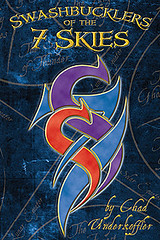I'm rapidly coming to the conclusion that Swashbucklers of the Seven Skies (henceforth refered to as S7S) is flawed. Flawed, but easily fixible. In fact the fix is so minor I'm surprised no one commented in playtesting.
S7S uses task resolution. Most tasks are resolved as challenges (any non-trivial task that a character is confronted with, where therewould be only mild consequences for failure) although significant high-drama, high-threat task are resolved as Duels. I'm going to discus the problem looking at challenges although the problem is just as true for duels. Its just easier to only have to discus one set of mechanics.
Challenges are resolved as a single roll. The player announces what they are doing. In one of the examples a player claims he is 'trying to charm a maid into letting him into the Countess Erzay’s townhouse'. The GM sets a difficulty, the player rolls, and succeed or fail the player narrates the outcome.
In most of the examples in the book the players Intent is clear, but it isn't always. In another example the player states that his character will 'attack the guards.' We have no idea if his intent is to kill them, to knock them unconscious, to distract them and keep them from noticing something else, or even to enrage them so they will throw him in jail. The GM at this point sets the difficulty and the player rolls.
There are two issues here. Firstly without knowing the players intent it is impossible to set a sensible difficulty on the task, and secondly without knowing what the intent was its impossible to know if the players 'failure' narration actually has the player failing to meet his intent.
The simple fix for this issue is to borrow a little from Luke Crane's three roleplaying games. Before any dice are rolled the GM and player both need to have agreed the task, the intent and the consequences of failure (the stakes). The task is the physical act which is to be performed, the intent is the result the character would like to see, the stakes are the results if failure isn't met.
So, for example a player might state, "I'll silence the guard" (an announcement of intent), to which the GM might respond "How?". The player will then probably give announce details of the task, "I'll sneak up behind them and hit them with my sap." We now have enough information for the GM to set stakes and difficulties. The GM might for example set a difficulty of Expert [11], and state that the stakes are that enough noise will be made that the alarm will be sounded". Now at last the player can roll them bones, happy that whatever the outcome he'll be in a position to narrate what happens.
Having talked about how S7S is flawed I feel its only fair to say something about how it's awesome. S7S has an amazing setting perfect for a Swashbuckling game. Not only is the setting action packed, but its memorable, interesting and fun, filled with plot hooks and easy to get to grips with. S7S also has the best roleplaying ship to ship combat rules I have ever seen. In addition the S7S style dice mechanism is stunningly good in play producing some of the most fun I've had in a long time. It encourages players to reward each other for clever, stylish, fun or just plain awesome play. Suddenly everyone is encouraging everyone else and having a brilliant time as a result. If you have any issues with negativity at the table, this game will dispel it. At the moment I'm rating S7S as my game of the year (although there are still six month to go so something may beat it - but thats going to have to be a truely stunning game).
S7S uses task resolution. Most tasks are resolved as challenges (any non-trivial task that a character is confronted with, where therewould be only mild consequences for failure) although significant high-drama, high-threat task are resolved as Duels. I'm going to discus the problem looking at challenges although the problem is just as true for duels. Its just easier to only have to discus one set of mechanics.
Challenges are resolved as a single roll. The player announces what they are doing. In one of the examples a player claims he is 'trying to charm a maid into letting him into the Countess Erzay’s townhouse'. The GM sets a difficulty, the player rolls, and succeed or fail the player narrates the outcome.
In most of the examples in the book the players Intent is clear, but it isn't always. In another example the player states that his character will 'attack the guards.' We have no idea if his intent is to kill them, to knock them unconscious, to distract them and keep them from noticing something else, or even to enrage them so they will throw him in jail. The GM at this point sets the difficulty and the player rolls.
There are two issues here. Firstly without knowing the players intent it is impossible to set a sensible difficulty on the task, and secondly without knowing what the intent was its impossible to know if the players 'failure' narration actually has the player failing to meet his intent.
The simple fix for this issue is to borrow a little from Luke Crane's three roleplaying games. Before any dice are rolled the GM and player both need to have agreed the task, the intent and the consequences of failure (the stakes). The task is the physical act which is to be performed, the intent is the result the character would like to see, the stakes are the results if failure isn't met.
So, for example a player might state, "I'll silence the guard" (an announcement of intent), to which the GM might respond "How?". The player will then probably give announce details of the task, "I'll sneak up behind them and hit them with my sap." We now have enough information for the GM to set stakes and difficulties. The GM might for example set a difficulty of Expert [11], and state that the stakes are that enough noise will be made that the alarm will be sounded". Now at last the player can roll them bones, happy that whatever the outcome he'll be in a position to narrate what happens.
Having talked about how S7S is flawed I feel its only fair to say something about how it's awesome. S7S has an amazing setting perfect for a Swashbuckling game. Not only is the setting action packed, but its memorable, interesting and fun, filled with plot hooks and easy to get to grips with. S7S also has the best roleplaying ship to ship combat rules I have ever seen. In addition the S7S style dice mechanism is stunningly good in play producing some of the most fun I've had in a long time. It encourages players to reward each other for clever, stylish, fun or just plain awesome play. Suddenly everyone is encouraging everyone else and having a brilliant time as a result. If you have any issues with negativity at the table, this game will dispel it. At the moment I'm rating S7S as my game of the year (although there are still six month to go so something may beat it - but thats going to have to be a truely stunning game).
This entry was posted
on Saturday, June 27, 2009
at 1:16 am
and is filed under
PDQ,
roleplaying,
S7S
. You can follow any responses to this entry through the
comments feed
.


